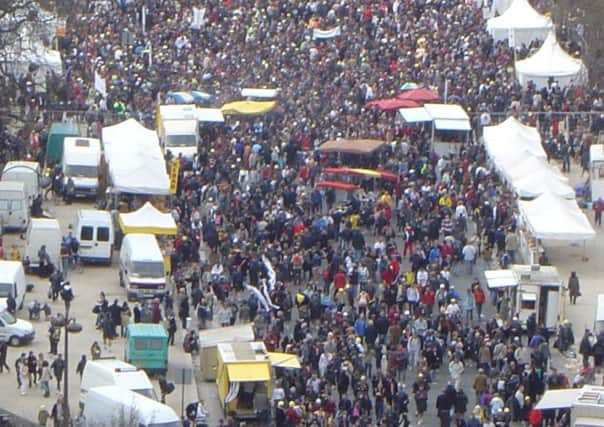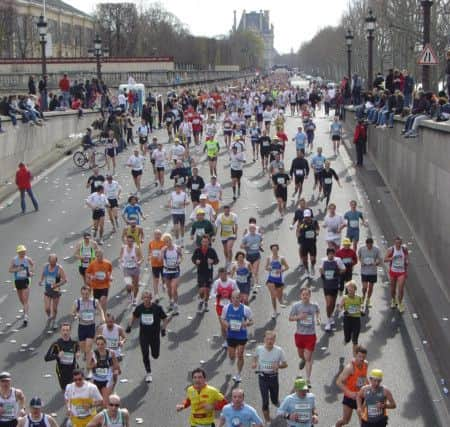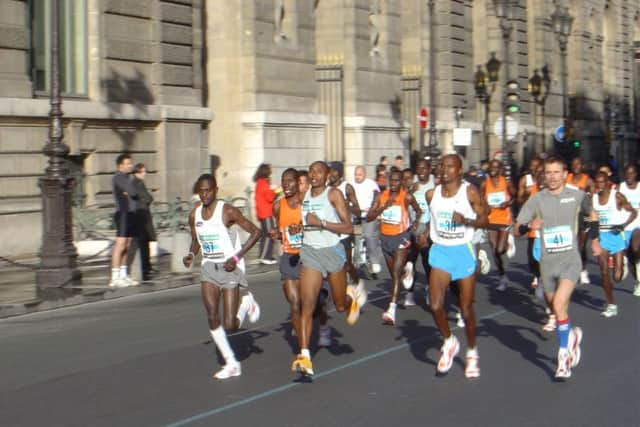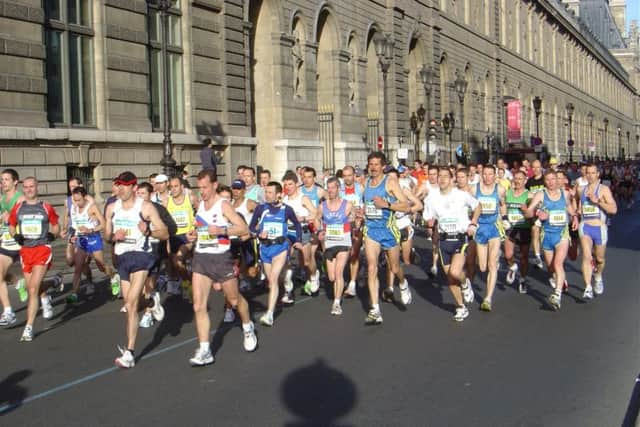Phil Hewitt: Why Paris nor basic goodness will be defeated


She looked at the wider picture and decided her injuries weren’t worth bothering the authorities with. She’s happy her son is currently working in London. She considers Paris a dangerous city.
These are desperately-troubling times. Deeply-depressing times.
Advertisement
Hide AdAdvertisement
Hide AdWe are facing an enemy unlikely to be cowed by conventional military action. ISIS is the lethal confluence of the most ghastly elements. Put together lack of hope, radicalising peer pressure, an utter lack of empathy and almost a desperation to die for the cause, and you’ve got an enemy it seems almost impossible to tackle.


And yet…
Take a look at these pictures. Take a look and take heart. They underline the reasons Paris will be strong in its crisis; the reasons Paris might actually be strengthened by the attacks.
These images are of the Paris Marathon.
And yes, it’s easy to be dismissive of sport, to believe it’s a mere pastime, that ultimately it has little consequence on the world stage.


But study these pictures closely and in them you will see our greatest weapon against terror, namely our shared humanity. Anyone who has ever taken part in a mass participation event will know just how elevating, just how moving, just how transcendent it can be when humanity converges for the most positive of reasons.
Advertisement
Hide AdAdvertisement
Hide AdI have run the Paris Marathon four times; each time I have run it almost drunk on the sheer buzz of it all: 26.2 miles through the streets of surely the world’s most beautiful city, egged on by the generosity and good will of hundreds of thousands of spectators almost every step of the way.
It’s the kind of thing that keeps us marathon addicts addicted to marathons.
Yes, French individuality will out; lane discipline is pretty dire; more than in any other marathon I’ve ever run, runners will cut across you, weave inside you and almost trip you time and time again.


And French eccentricity plays its part too. Where else would they dish out bananas still in their skins? Where else would they offer you a glass of wine after 25 and a miles?
Advertisement
Hide AdAdvertisement
Hide AdBut you can’t help loving the daftness of it all, wrapped up, as it is, in the greatest expression of human spirit you’ll ever find. To my mind, at least.
Others will worship a higher being; but on marathon day, its mankind itself that I am worshipping. And when you experience it in a city as gorgeous as Paris, you can’t help feeling, even in moments such as these, that there will always be hope in the world… all the while 50,000 runners can run through a city to the cheers of millions of spectators.
For all its beauty, the fact is that Paris has always been a city somewhat on the edge.
I first got to love it 30 years ago when I was teaching English in a forbidding, deprived, ugly Parisian suburb riven by racial tensions. Several times during the year, as I walked to the station, I passed policemen standing around a chalk outline marking where that night’s body had lain. It was chilling, horrible stuff… and those racial tensions have doubtless simmered ever since.
Advertisement
Hide AdAdvertisement
Hide AdBut once in Paris city centre, the magic of the city was as seductive as the French accent itself. Three or four times a week (the hours were pretty minimal at the school I worked at), I would hop on the train to central Paris. On a point of principle, I very, very rarely went to the same places… and it was months before I ran out of new places to explore.
It’s impossible to think of many richer or more fascinating places than Paris, so beautiful on the surface and so endlessly interesting below it. A place of such happy memories… not least the night, in thick, thick snow, I had far too much to drink with a Frenchman and a German in a Champs-Élysées bar.
There was no further snowfall that night. When the locals woke up the next morning, they found, finger-written in the snow on every bench in the Jardin des Champs-Élysées, a French swear word alongside its English equivalent next to its German counterpart.
Should I be ashamed? Maybe. But we were young, we were the worse for wear and we were let loose in the world’s most stunning city.
Advertisement
Hide AdAdvertisement
Hide AdBut even then, there were dark shadows. One person was killed in a bomb attack in the Marks & Spencer store in Boulevard Haussmann while I was strolling the city a mile or two away.
18 people were injured in the Rivoli Beaubourg cinema in Paris during a Jewish film festival; later that year there was a bomb attack against the Printemps Haussmann store; and then the following year there were three bomb attacks in three days, against the Claridge Hotel on the Champs-Élysées, a bookshop on the Place Saint-Michel and a Fnac store in Les Halles.
And all this just a couple of years after eight people died in a horrid attack on Orly airport.
As the French themselves say, plus ça change. But if it’s an expression of resigned acceptance of the immutability of human nature, so too perhaps is plus ça change an expression of our resilience. Think of the endless barricades on the streets of Paris as the city lived through the succession of revolutions which marked the 19th century, all the revolutions we Brits have forgotten about in the shadow of the most-famous French Revolution of all.
Advertisement
Hide AdAdvertisement
Hide AdThink too of the riots of 1968; the more recent riots, the riots that persist. Think too of the fact that Paris survived enemy occupation.
Paris is a city which has always worn its unease on its sleeve; but again perhaps, this is one of its strengths.
And so we come back to marathons…
Yes, they might accidentally try to trip you up during the Paris Marathon; and yes, insanely, they will throw thousands of bananas skins under your feet at various points along the route.
But the Paris Marathon remains one of the many reasons we must now cling to hope. It will have huge poignancy next April. Runners will run in memory of lost loved ones – just as they did in New York just after 9/11.
Advertisement
Hide AdAdvertisement
Hide AdThe greatest privilege I have ever enjoyed was to run the Big Apple in 2003. Scores of runners ran with messages of solidarity on their vests, images of murdered friends and family on their chests. All along the route, the New York firefighters were out to salute the city they had saved in its hour of need.
It was astonishingly moving, impossible not to run with a tear in your eye – impossible not to reflect on a very powerful reality: strength in adversity really does exist.
Which is why I love marathons.
Surely it’s not being fanciful to think that all the kindness, the care, the concern, the sheer, basic, fundamental decency which is poured out on marathon day in any big city anywhere in the world will somehow, surely, eventually count for more than hatred and vile cruelty.
Paris is a magnificent city, wonderful, exquisite and breathtakingly beautiful. Neither it, nor basic goodness, will be defeated.